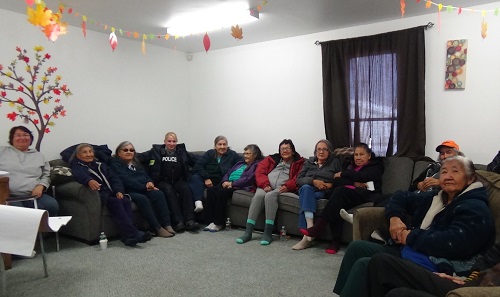The NYVRP’s Pelican Narrows community consultation. Photo provided by Shawna Bear. More photos can be viewed here.
A new justice initiative underway in the province’s northeast is designed to offer intensive supports to steer young people away from crime and gangs.
The Northeast Youth Violence Reduction Partnership (NYVRP) started taking referrals in the Pelican Narrows, Sandy Bay, and Deschambault Lake area in February and March. The partnership was designed in response to statistics that show gang life and violent crime in the region to be a national concern. This pilot version of the program will accept up to 45 youths between the ages of 12 and 24 in its first year.
“It’s not just about addressing reoffending, we’re also working with young people… who are at risk of offending or who are displaying signs of violence, of aggression, of bullying. And we are able to intervene… not meaning they’re dangerous or that there’s serious problems, just meaning that they have a lot of high needs areas in their lives that need to be addressed in order to bring that risk down to reoffend,” said Shawna Bear, who works with the Community Safety and Wellbeing Branch.
Bear admits there were initial concerns that it would be difficult to get people to sign up, but so far the program is at capacity with about 16 voluntary referrals in each active community.
“I think it’s 1) because we have great staff: they’re well-known in the community, well-respected in the community. And 2) young people and families are seeing what the programs are providing to them” by addressing obstacles to education, a healthy family life, positive peer groups, and an addiction-free life, Bear said.
Each community has a different name for its NYVRP program, Pelican Narrows’ is “Tamamawi-Maskawikapawiyak,” meaning Together We Stand Strong, Deschambault Lake’s is “Mithoyawin”, which means Being Healthy, and Sandy Bay is in the process of deciding on its name.
One doesn’t need to look far to see the need for this program – since 2015, at least three different teen males were killed in the Pelican Narrows and Sandy Bay regions, and earlier this year, a murder charge was laid after a woman went missing in the Deschambault Lake area.
So far, the successes of NYVRP are small but promising for Bear. She said local RCMP officers are getting less calls about the known troublemakers in the community, participants are opening up when meeting with staff even when “they’re known to be shut off or maybe they’ve burnt their bridges in the community,” and a volunteer tutor is offering help for the participants. It’s not always easy though, and Bear acknowledges there will be people who sign up that just stop showing up. In those cases workers will reach out for three weeks and put in effort to get the young person to return, but because this is a pilot project they are limited on how long they can try before moving on.
All of this is being coordinated by the provincial Ministry of Justice with help from the province’s universities, but funding comes from the National Crime Prevention Centre and Public Safety Canada. The idea for NYVRP was first developed in 2012 to address the lack of programming in the north-east and initial program funding was awarded in 2014. After that came consultations with Peter Ballantyne Cree Nations leadership, Elders and youth in the communities on how best to address the criminal risks and gang concerns about young people in the region.
Those talks identified priorities of addressing addictions, increasing the understanding of kinship, sharing language and culture to bring a sense of identity to young people — and were a part of what took so long to get the program underway.
Another lengthy process was the focus on contracting agencies within the community to deliver services “so this wasn’t government people coming in to do services,” Bear said.
She said there is a gang prevention component which is focused on helping young people fill their time in a healthy way with sports, education, hobbies, and finding long-term goals to strive towards.
NYVRP has guaranteed funding until March 31, 2020 and Bear said she is hoping the initial evaluations are positive enough that funding will continue in the future.
